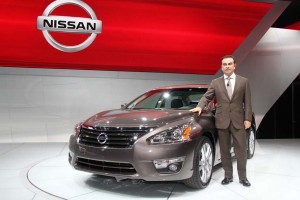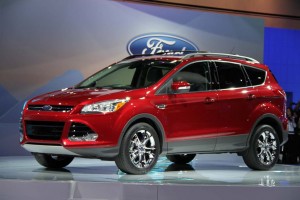Both Ford and Nissan are abandoning major hybrid-electric vehicles that might seem perfectly suited for a time when fuel prices are rapidly approaching record levels and consumers are looking for higher-mileage alternatives.
Nissan will no longer offer a hybrid Altima when it launches an all-new version of the midsize sedan for 2013. Ford, meanwhile, is scrapping the hybrid version of its Escape, which had the distinction of being the first-ever gas-electric SUV.
Though such decisions actually were made quite some time ago they impact new products coming to market during one of the fastest run-ups in fuel prices ever experienced in the U.S. market. And the two gas-electric models are dropping out just as hybrids – notably including the Toyota Prius – are setting all-time sales records.
So, why pull two hybrid versions of popular models like the Altima and Escape?
Nissan is, if anything, looking to do better than ever with the midsize sedan it has redesigned for 2013. Altima sales totaled 260,000 last year and once it’s fully up to speed, Nissan CEO Carlos Ghosn has said he believes the new model can surge to the top of the sales charts, overtaking long-time leaders Toyota Camry and Honda Accord.
But the hybrid has never been a factor in Altima sales, in part because it was only offered in a select few markets and never was backed by a significant push by Nissan or its dealers. Perhaps no surprise because the Altima Hybrid relied on a powertrain licensed from Toyota. It’s essentially the same system used in the competing Camry Hybrid – but because of the fees Nissan pays its Japanese rival it costs substantially more to produce.
Meanwhile, the new 2013 Altima will get an estimated 38 miles per gallon on the highway, putting it not far back from what the Camry Hybrid gets – but without the hefty hybrid price premium.
(For a first look at the new 2013 Nissan Altima, Click Here.)
As for Ford, the maker is also looking at a big jump in mileage for the 2013 Escape remake, even without the use of a hybrid drivetrain. Instead, Ford is turning to its new, high-mileage EcoBoost system. In fact, the new version of the crossover-utility vehicle will be offered with two – count ‘em, two – versions of the Ford EcoBoost powertrain, a 1.6-liter mileage miser and an only slightly less stingy 2.0-liter EcoBoost. The CUV will also be available with a 2.5-liter inline-four carried over from the outgoing Escape.
(Click Here for more on the 2013 Ford Escape.)
“At the end of the day, you always have to offer a business case” to justify using any individual powertrain, stressed Mark Fields, Ford’s President of the Americas, during a recent media roundtable. So, while the carmaker “wanted to offer a full range of powertrain options,” the hybrid package didn’t make economic sense on the newly revised Escape.
Ford and Nissan aren’t the only ones taking a close look at the logic of offering hybrids. Mazda has chosen to focus on its new SkyActiv technology, rather than gas-electric power. The new system – debuting on the 2013 Mazda CX-5 crossover – uses a variety of tricks, including higher compression and direct injection, to achieve near-hybrid fuel economy.
Ford’s EcoBoost likewise uses direct injection and turbocharging – and will soon be offered on 80% of the vehicles the maker sells in North America.
A new study by R.L. Polk could give still more reason for makers to rethink the need for hybrids. The Detroit-based data tracking service found that nearly two-thirds of American motorists trading in an old hybrid model in 2011 switched back to a conventionally powered vehicle.
(Click Here for that story.)
Nonetheless, both Ford and Nissan remain committed to electric propulsion. The latter maker, in fact, has now sold more pure battery-electric vehicles than any other auto manufacturer in history, and plans a significant expansion in sales of the Nissan Leaf this year, with a new production plant soon to come on line in Smyrna, Tennessee. Nissan’s Infiniti brand will launch a luxury battery-car by 2014 and the maker expects to introduce its first plug-in hybrid by then, as well.
Ford, meanwhile, is rolling out an array of battery-based vehicles, from a 47 mpg hybrid-powered version of the new Fusion sedan to a plug-in-powered C-Max microvan. There’s also the battery-electric version of the Focus subcompact that debuted last December.
And Nissan officials note that while Altima won’t have a hybrid at launch they are working on a new hybrid system of their own that could reappear in the midsize sedan later in its lifecycle.
Nonetheless, Ford’s decision to axe the Escape Hybrid, along with Nissan’s move to drop the Altima Hybrid — at least for now — show that even in an era where fuel economy is a prime factor for consumers, not all powertrains solutions work in every vehicle.



Not to be a stickler about things, but the 2009 Dodge Durango was the first gas/electric hybrid SUV. It was built for a very short time (probably only a few thousand–if that many–units were built, but I would consider it the first in that category.
Ford Escape Hybrid launched in 2004 as a 2005 model.